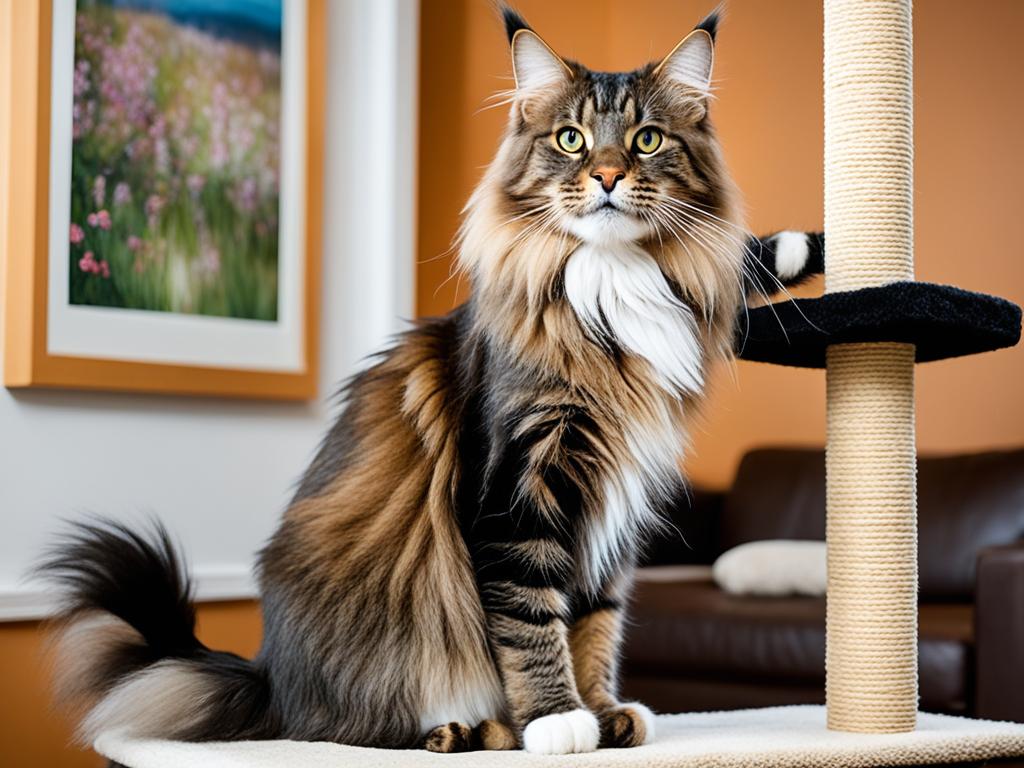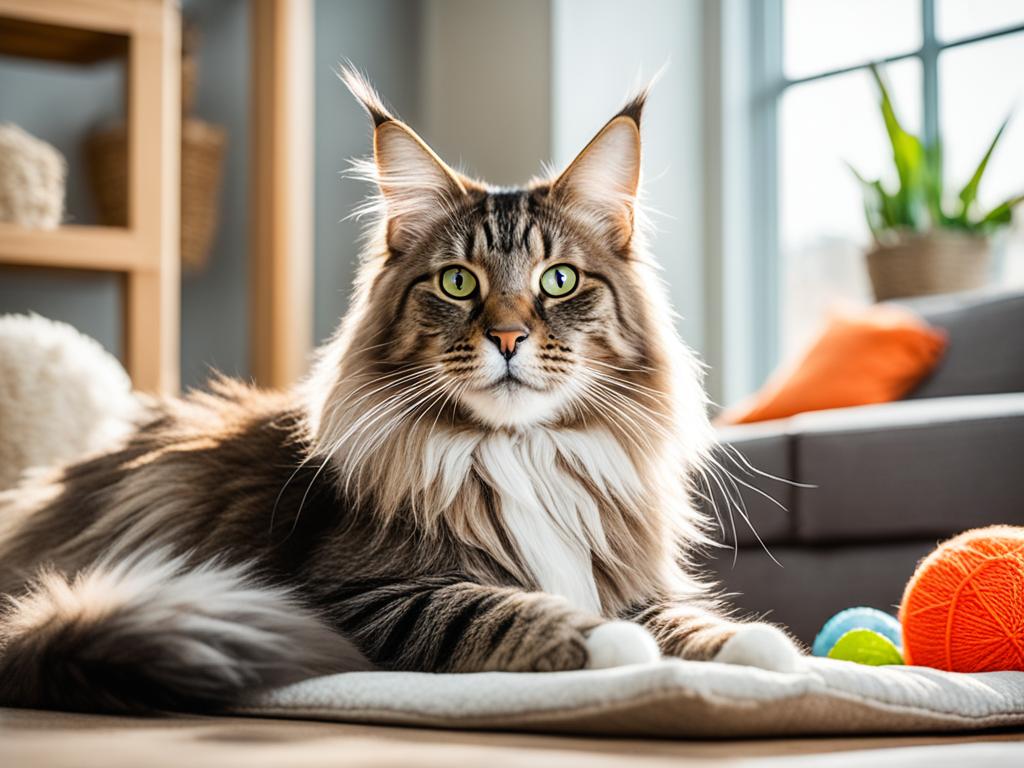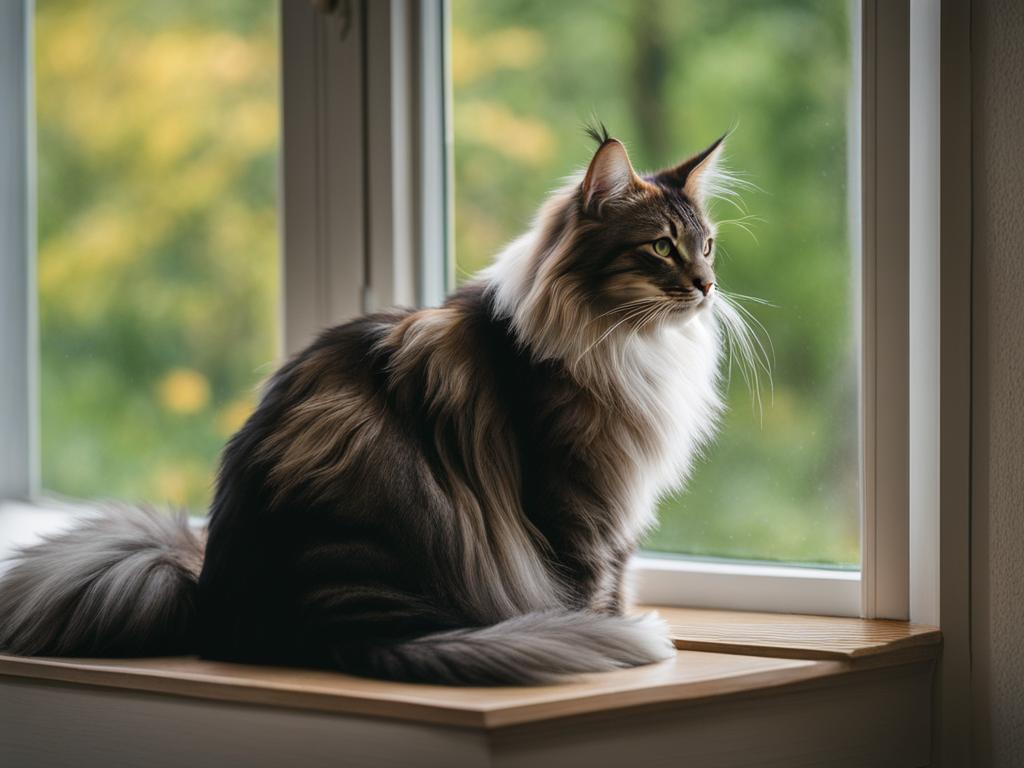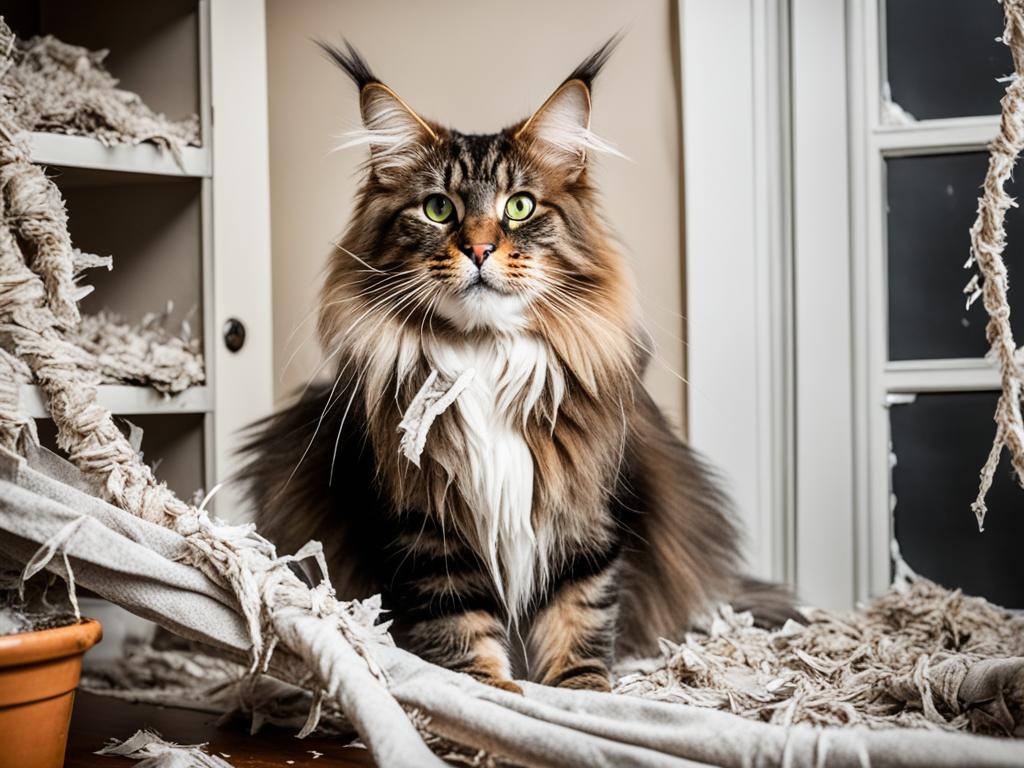Maine Coon cats, like any other cat breed, can develop behavior problems. Navigating these issues can be challenging for owners, especially those who are new to cat ownership. In order to effectively address these problems, it is important to understand the specific behavior issues that Maine Coons can experience. This section will explore 11 common behavior problems that Maine Coons may have and provide solutions for disciplining and training these cats.
Key Takeaways:
- Maine Coon cats can develop various behavior problems that require proper understanding and training.
- Knowing the common behavior issues in Maine Coons helps owners address and discipline their cats effectively.
- Proper training and discipline can improve behavior and enhance the bond between owners and Maine Coon cats.
- Addressing behavior problems in Maine Coons requires patience, consistency, and understanding.
- Seeking professional guidance can be beneficial when dealing with severe behavior issues in Maine Coons.
Solving Separation Anxiety in Maine Coons
Maine Coon cats, like any other breed, can develop separation anxiety, which can lead to behavioral challenges if not addressed early on. Separation anxiety is characterized by the cat’s inability to be away from their owner, even for short periods of time. The severity of separation anxiety can vary from mild distress to more extreme symptoms.
To tackle this issue and help Maine Coons cope with separation anxiety, there are a few strategies that owners can employ:
- Provide interactive toys: Engaging toys can help distract and entertain the cat when they are alone. Toys with moving parts or puzzle toys that dispense treats can be particularly effective in keeping the cat mentally stimulated and reducing anxiety.
- Utilize calming tools: There are various products available that can help calm anxious cats. For example, pheromone sprays or diffusers that mimic the scent of a mother cat can create a sense of comfort and security. Additionally, calming supplements or medications prescribed by a veterinarian may be considered in severe cases.
- Practice gradual separation: Gradually increasing the duration of time spent apart from the cat can help desensitize them to the feeling of being alone. Start with short periods of separation and gradually build up to longer durations to help the cat develop confidence and independence.
- Create a safe space: Designating a specific area in the home as a safe space for the cat can provide them with a sense of security. This space should be equipped with comfortable bedding, hiding spots, and familiar scents to help alleviate anxiety when the owner is away.
In addition to these strategies, it is essential for owners to stay patient and provide reassurance to their Maine Coon. Remember that it may take time for the cat to adjust to being alone and overcome separation anxiety. Consistency and positive reinforcement are crucial for reinforcing desired behaviors and helping the cat feel more secure.
Managing Furniture Scratching
Scratching furniture is a natural behavior for many cats, including Maine Coons. To prevent damage to furniture, it is important to provide scratching posts for the cat to use instead. Choosing a durable scratching post that matches the cat’s preferences can help redirect their scratching behavior. It is also important to read reviews and select a scratching post that will withstand the cat’s scratching strength.
When choosing a scratching post for your Maine Coon, consider the following:
- Height: Select a scratching post that is tall enough for your Maine Coon to fully extend their body while scratching.
- Stability: Ensure that the scratching post is stable and will not tip over or wobble while your cat uses it.
- Material: Opt for a scratching post made from durable materials, such as sisal rope or cardboard, that can withstand your cat’s scratching.
- Location: Place the scratching post in an area where your cat spends most of their time, such as near their favorite resting spot or in a room with high foot traffic.
Additionally, you can make the scratching post more appealing to your Maine Coon by:
- Rubbing catnip on the scratching post to attract your cat’s attention.
- Praising and rewarding your cat when they use the scratching post instead of furniture.
- Regularly trimming your cat’s nails to minimize the impact of their scratching on furniture.
Remember, it is important to be patient and consistent when redirecting your Maine Coon’s scratching behavior. With time and proper training, you can successfully manage their furniture scratching habits.
Tips for Training a Maine Coon
Training a Maine Coon can be a rewarding experience that strengthens the bond between you and your cat. Here are some tips to help you train your Maine Coon:
- Use positive reinforcement: Reward your Maine Coon with praise, treats, or playtime when they demonstrate desired behaviors.
- Be consistent: Establish a consistent routine and set clear boundaries for your cat.
- Use clicker training: Clicker training can be an effective method to teach your Maine Coon new behaviors.
- Be patient: Training takes time and patience. Avoid punishment and focus on positive reinforcement.
By implementing these training tips and providing appropriate outlets for your Maine Coon’s natural behaviors, you can help them become well-behaved and happy members of your household.
| Problem | Solution |
|---|---|
| Furniture scratching | Provide scratching posts, choose durable materials, and place them strategically in your home. |
| Separation anxiety | Provide toys and engage your cat in play before leaving, create a comfortable environment. |
| Territorial behavior | Introduce your Maine Coon to other cats at a young age, promote socialization. |
| Excessive vocalization | Check for underlying issues, establish a routine, and avoid rewarding excessive vocalization. |
| Nighttime activity | Engage in play and exercise before bedtime, establish a routine that discourages nighttime activity. |
| Litter box avoidance | Schedule a vet visit, provide a clean litter box, and address any territorial issues. |

Preventing Territorial Behavior
Maine Coons are known for their territorial nature, especially when there are other cats or animals in the household. To prevent territorial behavior in Maine Coons, it is crucial to promote socialization from a young age. Introducing the cat to other cats and providing opportunities for positive interactions can help them develop social skills and reduce territorial tendencies.
Early intervention is key in preventing territorial problems in Maine Coons. By gradually exposing them to different environments and experiences, owners can help their cats become more adaptable and less prone to territorial behavior. It is important to create a safe and comfortable space for each cat in the household, with enough resources like food, water, litter boxes, and resting areas to minimize potential conflicts over territory.
Additionally, providing environmental enrichment can help divert a Maine Coon’s attention away from territorial behaviors. Interactive toys, scratching posts, and vertical spaces for climbing can offer mental stimulation and physical exercise, reducing the need for territorial marking or aggression.
Benefits of Early Socialization
Early socialization plays a crucial role in preventing territorial behavior in Maine Coons. When kittens interact with other cats, humans, and various stimuli during their critical socialization period (between 3 to 9 weeks of age), it helps shape their behavior and temperament in adulthood. Socialized cats are generally more confident, friendly, and less likely to display territorial aggression.
During the critical socialization period, kittens should have positive experiences and gentle exposure to other cats, animals, and humans. This can include supervised playdates, gentle handling, and exposure to different sounds and environments. By gradually exposing them to new experiences, owners can help Maine Coons develop the necessary social skills to navigate their surroundings without feeling threatened or territorial.
| Steps to Prevent Territorial Behavior | Benefits |
|---|---|
| Socialize Maine Coons from a young age | Reduces territorial tendencies and promotes positive interactions with other cats |
| Create separate safe spaces for each cat | Minimizes potential conflicts over territory and resources |
| Provide environmental enrichment | Reduces boredom and redirects focus away from territorial behaviors |

Addressing Excessive Vocalization
Maine Coon cats are known for their vocal nature, often expressing their unhappiness or desires through loud meowing. If you find that your Maine Coon is exhibiting excessive vocalization, it’s essential to address the issue promptly and effectively. Understanding the underlying reasons behind this behavior can help you find the right solution and overcome your Maine Coon’s anxiety.
To begin, it’s important to check for any immediate needs that your Maine Coon may be trying to communicate. Hunger or thirst can often be a cause of excessive vocalization. Ensure that your Maine Coon has access to fresh water and is being fed a balanced and nutritious diet appropriate for their age and health needs.
If your Maine Coon is seeking attention through vocalization, it’s crucial to resist the temptation to reward this behavior. Giving in to their demands will only reinforce the idea that excessive meowing leads to getting what they want. Instead, practice patience and ensure that your Maine Coon receives attention and affection when they are calm and quiet.
Another important aspect to address excessive vocalization is to understand your Maine Coon’s personality and provide appropriate mental and physical stimulation. Maine Coons are intelligent and active cats, and boredom or pent-up energy can contribute to excessive meowing. Engage your Maine Coon in interactive play sessions and provide toys or puzzle feeders that mentally challenge them.
Creating a calm and peaceful environment for your Maine Coon is also essential. Reduce any potential stressors or triggers that may be causing anxiety for your cat. Establish a routine that includes regular feeding times, play sessions, and quiet periods for rest and relaxation.
Ultimately, overcoming Maine Coon anxiety and excessive vocalization requires patience, understanding, and consistency in your approach. By addressing their needs, providing mental and physical stimulation, and creating a tranquil environment, you can help your Maine Coon find balance and reduce their tendency to vocalize excessively.

Summary
In summary, excessive vocalization is a common behavior issue observed in Maine Coon cats. It is important to check for any immediate needs, such as hunger or thirst, and avoid rewarding attention-seeking behavior. Providing mental and physical stimulation, establishing a consistent routine, and creating a calm environment can help overcome Maine Coon anxiety and reduce excessive vocalization.
Managing Nighttime Activity
Maine Coons, known for their active nature, can often become restless during the night if they haven’t expended enough energy during the day. To ensure a peaceful night’s sleep for both you and your feline friend, it’s important to manage their nighttime activity effectively.
Tips for Training a Maine Coon:
- Engage in Play and Exercise: Before bedtime, provide ample playtime and exercise for your Maine Coon to help tire them out. Play interactive games that encourage physical activity and mental stimulation. This will help expel their excess energy and promote a calmer atmosphere during the night.
- Establish a Routine: Consistency is key when it comes to managing nighttime activity. Set a regular schedule for feeding, playtime, and bedtime. Maine Coons thrive on routine and having a structured day can help them adjust their energy levels accordingly.
- Create a Calming Environment: Make your Maine Coon’s sleeping area comfortable and enticing for them to rest in. Provide a cozy bed, ensure the room is dimly lit, and minimize noise disturbances to create a peaceful atmosphere that encourages sleep.
- Use Positive Reinforcement: When your Maine Coon exhibits calm behavior during the night, be sure to reinforce and reward it with praise or treats. Positive reinforcement will help them understand what is expected of them and encourage the desired nighttime behavior.
- Ignore Nighttime Disturbances: If your Maine Coon tries to get your attention during the night, avoid rewarding the behavior by withholding attention or interaction. Ignoring their attempts will help deter the habit of seeking attention during sleep hours.
By implementing these tips for training a Maine Coon, you can effectively manage their nighttime activity and ensure a restful night for both you and your feline companion.
Dealing with Litter Box Avoidance
When it comes to Maine Coon cats, a clean litter box is essential for preventing any litter box problems. Normally, Maine Coons are known for their cleanliness and will use the litter box without issue. However, if your Maine Coon is avoiding the litter box, it could be a sign that something is not right.
The most common reasons for litter box avoidance in Maine Coons include underlying medical issues or territorial problems. To rule out any medical problems, it is important to schedule a visit to the veterinarian. They can perform a thorough examination and recommend appropriate treatment if necessary.
In addition to addressing any potential medical issues, ensuring a clean litter box is crucial. Scoop the litter box daily and completely change the litter every few days. Maine Coons prefer a clean environment for their bathroom needs. This alone can go a long way in resolving litter box avoidance issues.
Furthermore, take into consideration any territorial problems that may be affecting your Maine Coon’s litter box behavior. Maine Coons are known to be territorial animals, and if there are other cats or animals in the household, it’s important to address any territorial disputes. Providing separate litter boxes for each cat and creating a peaceful environment can help prevent litter box avoidance due to territorial behavior.
FAQ
What are some common behavior issues that Maine Coons can have?
Maine Coon cats can develop behavior problems such as separation anxiety, territorial behavior, excessive vocalization, and nighttime activity.
How can I tackle separation anxiety in my Maine Coon?
To tackle separation anxiety in Maine Coons, try providing toys for the cat to play with when they are alone. Tiring the cat out before leaving and establishing a routine can also help reduce anxiety.
How can I manage furniture scratching in my Maine Coon?
To prevent furniture scratching, provide scratching posts for the cat to use instead. Choosing a durable scratching post that matches the cat’s preferences is important.
How can I prevent territorial behavior in my Maine Coon?
Introduce your Maine Coon to other cats at a young age to promote socialization and prevent territorial behavior. Early intervention and proactive socialization can be helpful.
What should I do about excessive vocalization in my Maine Coon?
When dealing with excessive vocalization, it is important to check for underlying issues and ensure basic needs are met. Avoid rewarding the behavior and practice patience and understanding.
How can I manage nighttime activity in my Maine Coon?
Engaging in play and exercise with your Maine Coon before bedtime can help tire them out and discourage nighttime activity. Ignoring attention-seeking behavior at night without rewarding it is important.
How can I address litter box avoidance in my Maine Coon?
If your Maine Coon starts avoiding the litter box, schedule a veterinary visit to rule out any medical issues. Providing a clean litter box and addressing territorial problems can also help resolve the issue.

Leave a Reply